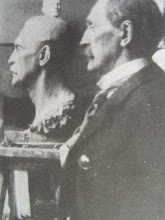



Sevilla, 1870.
A long day with the Commissionaire, Alfonse Laboisse, visiting curiosity shops. Our only purchases were at Mariano Fernandez's, 17 Calle de Canteros, a littly Rosary with gilt filigree (8/4). Two small leaves with currants in relief of either Staffordshires or Fullham Ware (15/-); and a pair of old paste bracelet snaps (12/6) which I bought for Enid, who collects these things.
At a little shop, Diego Astma's, 97 Alameda de Escale, we found a curious collection, chiefly of broken things. Among them a very fine Moustier Ware dish, most delicately painted in blue, with the Rape of Helen in the centre, and Olympian deities and Arabesques all round and about her. Unfortunately it had been broken things. Among them a very fine Moustier Ware dish, most delicately painted in blue, with the Rape of Helen in the centre, and Olympian deities and Arabasques all round and about her. Unfortunately it had been broken but had been well mended; for this we gave 1.10.0. At the same time we got a little marked Buen Retiro figure of Africa, one arm wanting, the head also having been off. Though the man knew nothing of what it really was, we had to give a sovereign for it. Antiquities are dear and bad at Seville!
We looked at a frame with a small man, Cabriller, 20 St. Elay, but did not buy it. Called at an Italian's Vivaldis, 17 Mendez Nuños, who had some extravagantly dear cabinets, and also a few good pieces of French ware, about which we paused. He is dear, and is a man I do not like, but has intelligence. I fancy he buys all poor Diego Astma's good things from the small miscellaneous shop and sells them at great profit. Wen to Don Jose Devera, 33 Calle Amor de Dios, a superior kind of dealer, who has fine and high-priced things. To Ignacio Gallindo, 17 Calle de Saragosa, who was absent at Madrid, so that we saw nothing with him (his Madrid address is Fonda de Paris, or des Princes).
Lastly, to Don Manuel Robles, 5 Calle de la Cuna. He is a man of good means, a private gentleman, and buys and sells because he says it is his amusement; certainly he was our amusement for the time- but he talks too much, and his descriptions in bad French are interminable. We promised to see him again. We were told tonight that there were disturbances at Triana, but in the morning all was reported quiet. However, news came of a revolt at Barcelona.
At a little shop, Diego Astma's, 97 Alameda de Escale, we found a curious collection, chiefly of broken things. Among them a very fine Moustier Ware dish, most delicately painted in blue, with the Rape of Helen in the centre, and Olympian deities and Arabesques all round and about her. Unfortunately it had been broken things. Among them a very fine Moustier Ware dish, most delicately painted in blue, with the Rape of Helen in the centre, and Olympian deities and Arabasques all round and about her. Unfortunately it had been broken but had been well mended; for this we gave 1.10.0. At the same time we got a little marked Buen Retiro figure of Africa, one arm wanting, the head also having been off. Though the man knew nothing of what it really was, we had to give a sovereign for it. Antiquities are dear and bad at Seville!
We looked at a frame with a small man, Cabriller, 20 St. Elay, but did not buy it. Called at an Italian's Vivaldis, 17 Mendez Nuños, who had some extravagantly dear cabinets, and also a few good pieces of French ware, about which we paused. He is dear, and is a man I do not like, but has intelligence. I fancy he buys all poor Diego Astma's good things from the small miscellaneous shop and sells them at great profit. Wen to Don Jose Devera, 33 Calle Amor de Dios, a superior kind of dealer, who has fine and high-priced things. To Ignacio Gallindo, 17 Calle de Saragosa, who was absent at Madrid, so that we saw nothing with him (his Madrid address is Fonda de Paris, or des Princes).
Lastly, to Don Manuel Robles, 5 Calle de la Cuna. He is a man of good means, a private gentleman, and buys and sells because he says it is his amusement; certainly he was our amusement for the time- but he talks too much, and his descriptions in bad French are interminable. We promised to see him again. We were told tonight that there were disturbances at Triana, but in the morning all was reported quiet. However, news came of a revolt at Barcelona.
Lady Charlotte Guest Schreiber, Lady Charlotte Schreiber's Journals. Confidences of a Collector of Ceramics and antiquities thorought Britain, France, Holland, Belgium, Spain, Portugal, Turkey, Austria and Germany from the year 1869 to 1885. Londres: Her son Montague J. Guest, 2 vols.

The Wunderkammer of Lady Charlotte Guest examines the life of a truly extraordinary Victorian woman, Lady Charlotte Guest Schreiber. Lady Charlotte learned Welsh in order to provide the first complete translation of the Mabinogion; ran her late husband's ironmongery until her eldest son attained his majority; then married a man fourteen years her junior and enjoyed a distinguished career as a collector of porcelain, playing cards, and fans. Although Lady Charlotte's biography is fascinating in its own right, the scholarly emphasis of this book centers on how the impulse to collect informed her translations and her journals as well as her later catalogues. Using the theories of Jean Baudrillard, Walter Benjamin, Mieke Bal, Susan Miller, and Susan Pierce, this book examines how collecting allowed Lady Charlotte to create a series of private signifying systems that often countered the prevailing Victorian discourse assigned to women.















No hay comentarios:
Publicar un comentario